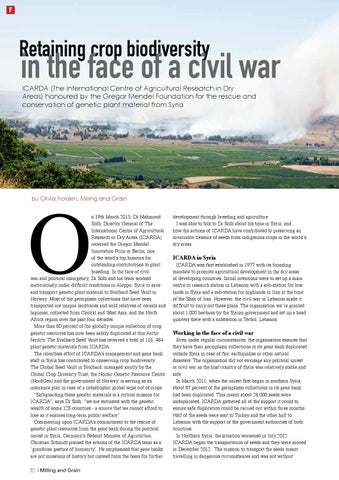F
Retaining crop biodiversity
in the face of a civil war ICARDA (The International Centre of Agricultural Research in Dry Areas) honoured by the Gregor Mendel Foundation for the rescue and conservation of genetic plant material from Syria
O
by Olivia Holden, Milling and Grain
n 19th March 2015, Dr Mahmoud Solh, Director General of The International Centre of Agricultural Research in Dry Areas (ICARDA) received the Gregor Mendel Innovation Prize in Berlin, one of the word’s top honours for outstanding contributions to plant breeding. In the face of civil war and political insurgency, Dr Solh and his team worked meticulously under difficult conditions in Aleppo, Syria to save and transport genetic plant material to Svalbard Seed Vault in Norway. Most of the germplasm collections that have been transported are unique landtraces and wild relatives of cereals and legumes, collected from Central and West Asia, and the North Africa region over the past four decades. More than 80 percent of the globally unique collection of crop genetic resources has now been safely duplicated at this Arctic facility. The Svalbard Seed Vault has received a total of 116, 484 plant genetic materials from ICARDA. The relentless effort of ICARDA’s management and gene bank staff in Syria has contributed to conserving crop biodiversity. The Global Seed Vault in Svalbard, managed jointly by the Global Crop Diversity Trust, the Nordic Genetic Resource Centre (NordGen) and the government of Norway, is serving as an insurance plan in case of a catastrophic global wipe out of crops. “Safeguarding these genetic materials is a critical mission for ICARDA”, says Dr Solh, “we are entrusted with the genetic wealth of some 128 countries - a source that we cannot afford to lose as it ensures long-term public welfare”. Commenting upon ICARDA’s commitment to the rescue of genetic plant resources from the gene bank during the political unrest in Syria, Germany’s Federal Minister of Agriculture, Christian Schmidt praised the actions of the ICARDA team as a ‘grandiose gesture of humanity’. He emphasised that gene banks are not museums of history but instead form the basis for further
52 | Milling and Grain
development through breeding and agriculture. I was able to talk to Dr Solh about his time in Syria, and how the actions of ICARDA have contributed to preserving an invaluable treasure of seeds from indigenous crops in the world’s dry areas.
ICARDA in Syria
ICARDA was first established in 1977 with its founding mandate to promote agricultural development in the dry areas of developing countries. Initial intentions were to set up a main centre or research station in Lebanon with a sub-station for low lands in Syria and a sub-station for highlands in Iran at the time of the Shah of Iran. However, the civil war in Lebanon made it difficult to carry out these plans. The organisation we’re granted about 1,000 hectares by the Syrian government and set up a head quarters there with a substation in Terbol, Lebanon.
Working in the face of a civil war
Even under regular circumstances, the organisation ensures that they have their germplasm collections in its gene bank duplicated outside Syria in case of fire, earthquakes or other natural disasters. The organisation did not envisage any political unrest or civil war as the host country of Syria was relatively stable and safe. In March 2011, when the unrest first began in southern Syria, about 87 percent of the germplasm collections in its gene bank had been duplicated. This meant about 28,000 seeds were unduplicated. ICARDA gathered all of the support it could to ensure safe duplication could be carried out within three months. Half of the seeds were sent to Turkey and the other half to Lebanon with the support of the government authorities of both countries. In Northern Syria, the situation worsened in July 2012. ICARDA began the transportation of seeds and they were moved in December 2012. The mission to transport the seeds meant travelling in dangerous circumstances and was not without
